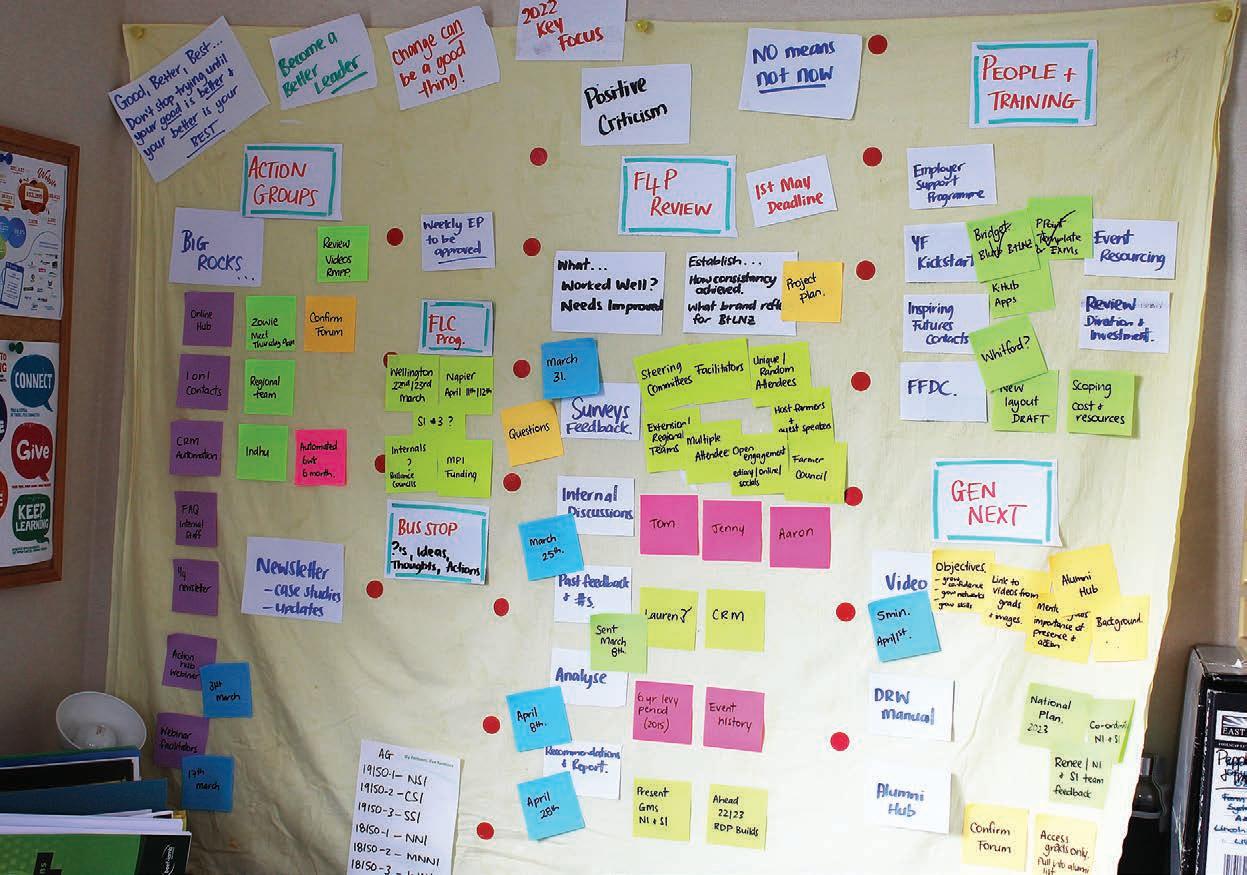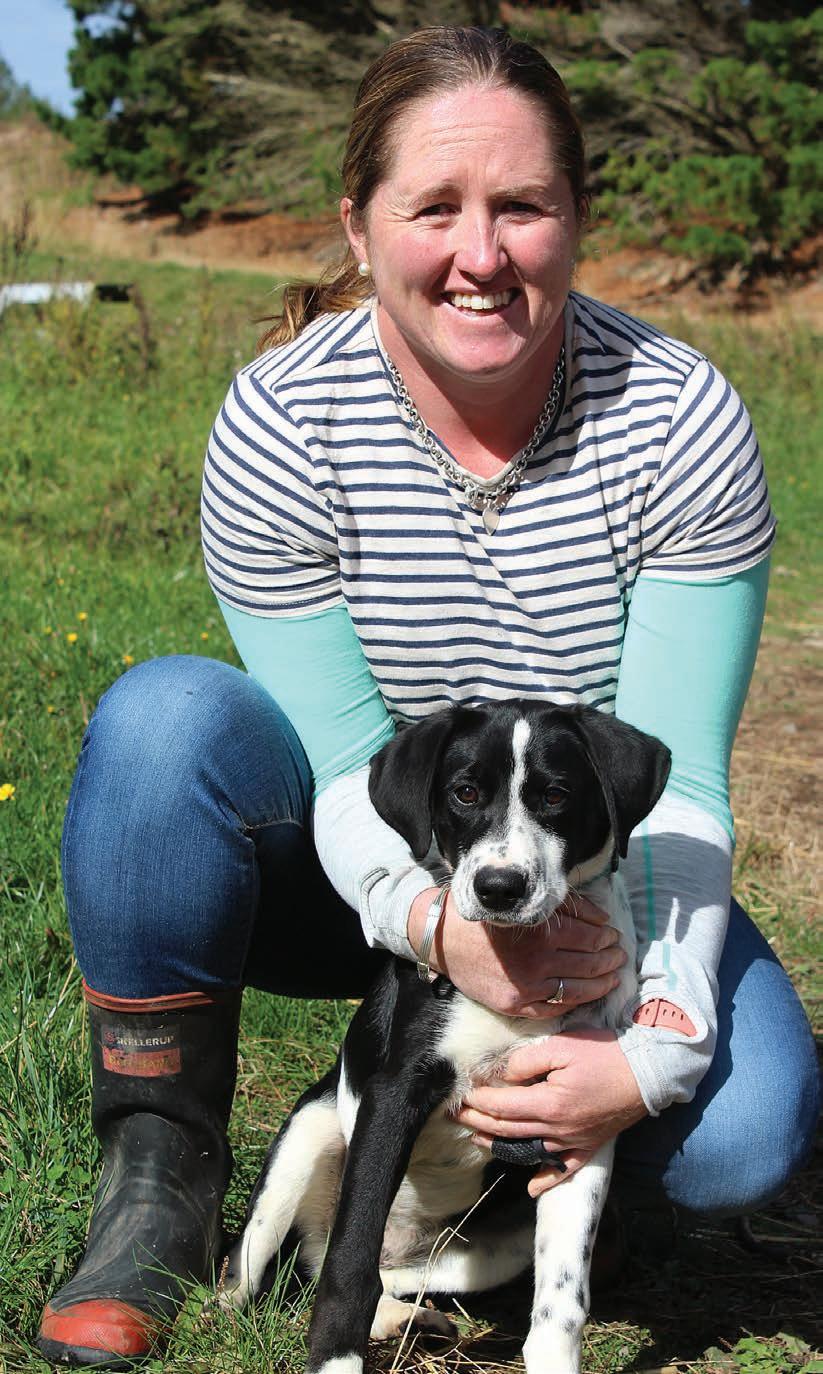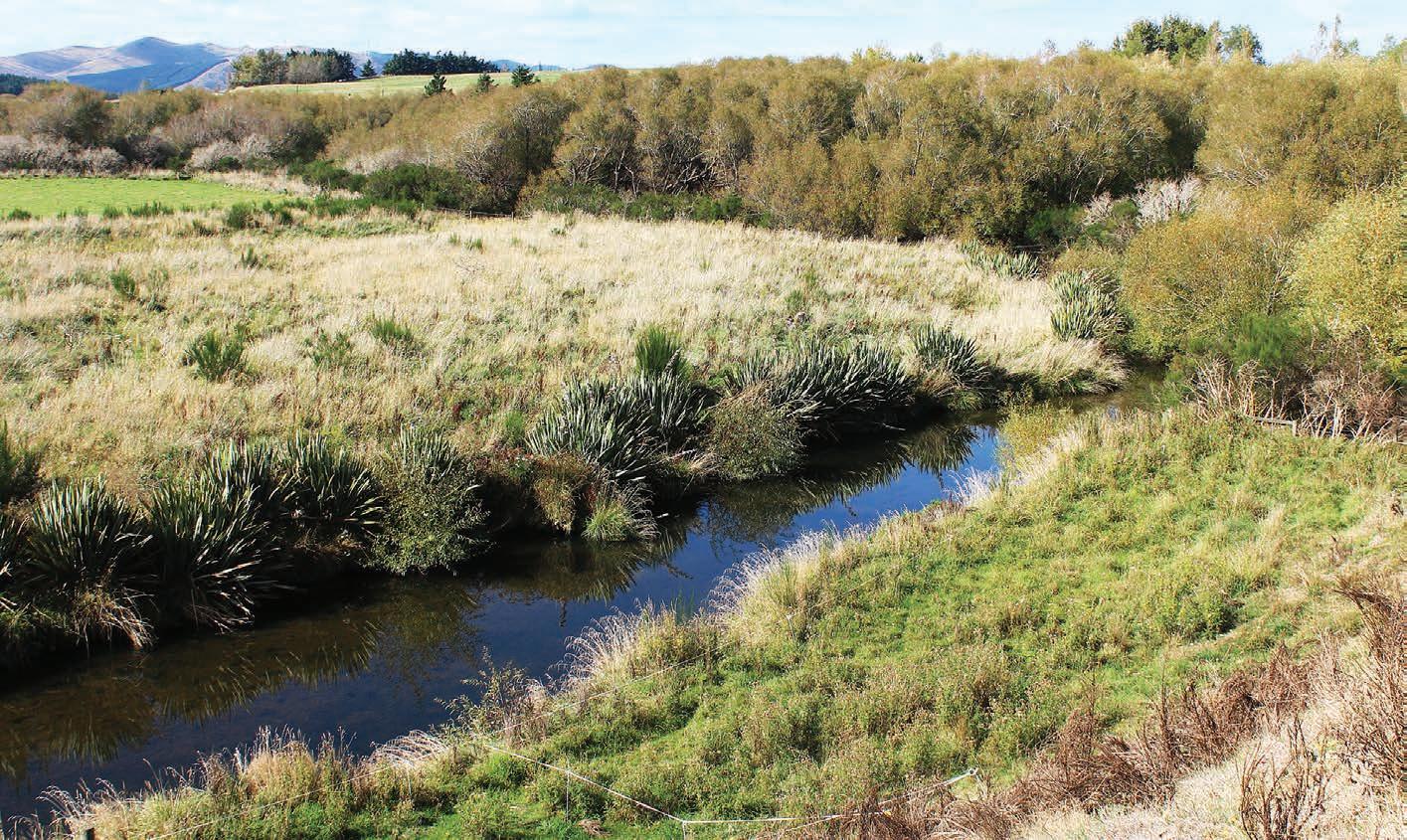
11 minute read
On Farm Story
24 FARMERS WEEKLY – farmersweekly.co.nz – April 18, 2022
On Farm Story Giving back to the community
The saying goes that if you want action, ask a busy person. OIivia Weatherburn is a busy person. She tells Neal Wallace that she loves promoting agriculture and is about to broaden her activities with a new podcast initiative publicising career opportunities in the industry.
OLIVIA Weatherburn had the nickname Farmish when she was a student at Otago Girls’ High School.
The moniker reflected the reality that she was about the only student at the Dunedin high school with an agricultural background.
“I remember giving a speech in the fifth form on the seasons of farming and remember people laughing a lot when I talked about drenching and crutching,” Olivia said.
“A lot of that reaction was due to the fact that they did not know what they did not know.”
Similarly, she would take city friends out to the farm her parents were managing on the Maungatua Hills, which overlook the Taieri Plains.
For virtually all of them, it was their first time on a farm.
“That was an eye opener, I learnt a lot,” she said.
It was an experience that still resonates with her.
“You don’t know what you don’t know and you have to put yourself in other people’s shoes to understand them,” she said.
Her passion for the primary industry is rooted in an upbringing spent on farms in Otago and Southland, a lifestyle she considers a privilege and one she feels worthy of sharing
“I had such a cool childhood,” she said.
Olivia lives with husband Willy, who manages Braxton View, a 500ha sheep and beef farm near Mossburn in Northern Southland.
An earlier back injury, while working as a shepherd, forced her to change plans to be a farm worker or farm owner to a career in rural servicing.
The change allowed her to unleash her boundless energy, passion and enthusiasm for the primary sector, along with strength as an organiser and motivator to encourage people into the industry and run programmes to upskill farmers.
Her orderly office reflects a busy person, but being organised and having practical attributes assists her to relate and interact with farmers.
Olivia was born and bred in Western Southland, where her parents managed farms.
Initially she boarded at Southland Girls’ High School in Invercargill before moving to Otago Girls’ High School when her parents moved to a property near Dunedin.
After leaving high school she went to Lincoln University where she initially studied a Bachelor of Agricultural Science, but her strength in things practical rather than science came back to haunt her.
“Chemistry and I did not get on at high school and we did not get on at university,” she said.
After a year she switched to a Diploma in Farm Management, which she says still opened the same doors but with skills learnt in a different way.
She took a year out between courses and worked as a shepherd on Linnburn Station in the Maniototo and then a property near Middlemarch.
It was perfect for her, with low-lying paddocks rising up to tussock hill country.
“I was living the dream. I had a team of dogs and a young horse that I was barrel racing,” she said.
It was while working there that she was taken out by an angry cow, hurting her back for which she, regrettably, did not immediately seek treatment.
“Ten years later I had three surgeries on my back and that angry cow was the cause,” she said.
Returning to Lincoln she completed her diploma, then headed to Australia with just $300 cash in her pocket.
She had work arranged on Ross and Katrina Ford’s Forrest Home cattle station in Queensland that provided an outlet for her passion of riding horses while working with stock.
It also led to a job in the couple’s sideline retail business, selling western wear at shows and camp drafts.
“I got the job because I could back a Ford 5250 and a gooseneck trailer,” she said.
It all added to her knowledge, skill and experience.
On returning to New Zealand, she worked for five years for Outgro Bio Agriculture, a North Island fertiliser company that sold customised soil nutrient, fine particle and slurry mixes.
It was her job to expand the business into Southland.
“The model was healthy soil, healthy pasture and healthy stock,” she said.
“It meant meeting farmers, taking soil and herbage tests, looking at the whole picture.”
During that time she bought a house and 2ha at Balfour for her horses and some sheep, but it became apparent that farm ownership would not only be financially difficult, but physically impossible due to her back injury.
She met and later married Willy, who was working and managing farms in the Southland.
Over winter he worked as an ice maker for the Southern Hemisphere Proving Ground on the Pisa Range near Wanaka.
International car makers and tyre manufacturers use the ground during the Southern Hemisphere winter for testing and his job was to work at night, to ensure they had the right quality ice and snow for the testers.
While at university, Olivia won a Beef + Lamb NZ (B+LNZ) scholarship and after five years working for Outgro Bio, in 2015 she joined the producer body as the southern South Island extension manager.
It also provided an outlet and a vehicle for her enthusiasm for the sector and a chance to make a difference for sheep and beef farmers.
In May last year she moved to a new role as national extension programme manager within B+LNZ, a position to assist the management of the organisation’s extension programmes.
That includes working with extension officers, reviewing the extension programmes delivered by B+LNZ, while also leading projects such as the B+LNZ Action Groups, which was previously the Red Meat Profit Partnership (RMPP).
The list of further initiatives she has been, and is still involved in, is extensive and varied.
One area of particular interest is exposing young people to the primary sector using some innovative techniques.
At the 2020 Southern Field Days in Southland, she launched an amazing race-type event with local schools, called a Food and Fibre Discovery Challenge.
Three hundred students were split into teams and given challenges to complete that were associated with agriculture.
Later that year a further 300 students competed in a similar event at Ag Fest in Greymouth.
The event required students to visit 40 prearranged sites at the field days, on which they had to answer questions or undertake challenges but were also exposed to potential careers.
“It was like a game and if you put some fun into it, it helps them relate and then you are winning,” she said.
Many companies involved in
Olivia Weatherburns Farmer

WORK IN PROGRESS: Olivia Weatherburn is training Patch, a new heading dog.
RIPARIAN PLANTING: The Hamilton Burn, which flows through the farm where the Weatherburn’s live, is alive with fish and eels.

Olivia Weatherburn Farmer
the challenge said they would be happy for students to spend a day on the job with them to learn more about career opportunities.
“At the end of the day, the more you can influence someone at a young age, the more successful you will be,” she said.
The exercise also gave students a purpose for the day and teachers resources for subsequent school lessons, further exposing students to the primary sector.
Covid has meant a halt to the initiative, but she hopes to resurrect it when field days return.
A key to improve the understanding of the primary sector is to educate young people where food comes from.
“It is easier before the myths and influence of social media takes over,” she said.
Part of that is education and she sees solutions in her own schooling experience.
Not a fan of algebra, she said it would have been more relatable for her if it had been taught in the context of genetics.
“I would have had a whole new perspective,” she said.
Being involved in initiatives like Teachers’ Day, run by Grow NZ, in which teachers of subjects as diverse as the sciences, economics and food technology, spend time on farms to learn about the sector and associated educational opportunities.
Many of these initiatives grew from a Kellogg Rural Leadership programme she completed in 2017, in which she studied the public perception of the red meat sector.
That project involved 70 interviews with people as diverse as trade envoys, teachers, fertiliser reps and farmers.
It also included interviews with recent school-leavers and Year 12 and 13 students.
“It was about people’s understanding of the red meat sector and their perception of job opportunities,” she said.
Her primary finding is that agriculture jobs are perceived as being for dummies.
That lack of understanding extends to the ignorance of the mainstream media who she says do not portray the sector accurately or the many career opportunities.
Olivia recalls talking with a graphic artist student who had no idea of the opportunities in the primary sector designing packaging, signage, promotional and marketing material for ruralbased companies.
B+LNZ’s Growing NZ is another primary sector initiative targeted at young people.
Year 10 and 11 science and business students are presented with challenges facing the primary sector and encouraged to think freely of possible solutions.
“It’s not about finding a solution that works, but helping students realise that business and science brains are relevant to the sector and can be involved,” she said.
Other B+LNZ projects being led by Olivia are about technology transfer to farmers, but also creating the right structure and environment to enable the exchange of knowledge such as teaching facilitators how to conduct meetings and field days.
The programme she is most proud of is the B+LNZ Generation, which involves three workshops over six months.
The programme is designed to assist farmers understand the financial basics and management of their business, develop better decision-making skills, understand technology and genetics within the industry, understand the importance of managing mental health and personal wellbeing, along with industry goals and aims.
She is now branching out further her love and passion for agriculture.
Together with GlobalHQ, publishers of the Farmers Weekly, she is about to launch a podcast series, The Road to Rural, in which she talks to those working in the sector about their jobs.
The idea is to promote the breadth of employment opportunities and careers that support the food and fibre industries: “everything from the lab to the land,” she said.
“Someone listening to an interview in the podcast could think ‘I want to do that’.”
She hosts her own podcast on The Equine Life and tells how one listener was so inspired she went and volunteered at her local Riding for the Disabled.
Olivia thinks that if you have a good idea, there is little point in not acting on it, then one day wishing that you had.
“I live and breathe this sector which I absolutely love, so I have no qualms about giving back,” she said.
“It’s not money in the bank account which gives me wealth, it is the doors that have opened and the people I have met, the knowledge I have acquired and the places I have been.”
She has a vision that one day the primary sector will not be searching for workers, rather people will be drawn to it.
That one day every school will promote agriculture equally with other careers and urban people will have a greater appreciation and understanding of the sector.
Similarly, she would love every school to run a Teen Ag or Agrikids class, which exposes them to the rural sector, while also helping develop life skills such as communication and working with others.
“If every person in NZ understands the process of what went into producing that piece of lamb, cut of steak, milk, cheese, chocolate, lettuce, apple or woollen jersey, then we would see such a change in attitude between urban and rural sectors,” she said.
She believes every farmer has a responsibility to try and break down that divide and they can do that by participating in the annual Open Farms programme, but also inviting urban school classes onto their farms.
“Every year Open Farms struggles to get enough farmers to open their gates and everyone has connections to schools, so invite them to come out and have a look,” she said.
Her enthusiasm and leadership attributes were recognised by being one of four finalists in the 2022 Zanda McDonald Awards, for which she says she was honoured.
“It’s not what you know but whom you know that gets you places,” she said.
“Knowing that the home fires are able to keep going while I am away enables me to give 100% to my passions.”
But achieving her goals would not be possible without the people she has met and supported along the way.
“As much as my husband may roll his eyes at yet another one of my ideas, his support needs to be acknowledged,” she said.
She also hunts, fishes, is a former national barrel race champion, volunteer firefighter, Lions member and life member of Otago-Southland Young Farmers.
There is a large board attached to her office wall covered in postit notes and a separate piece of paper with a multitude of projects linked by lines and numbers prioritising tasks.
Olivia somewhat dismissively scoffs that this is how she plans her life. Another interpretation is that this is a war room in the battle to sell the attributes of and to improve the primary industry.
>> Video link: bit.ly/ OFSWeatherburn







